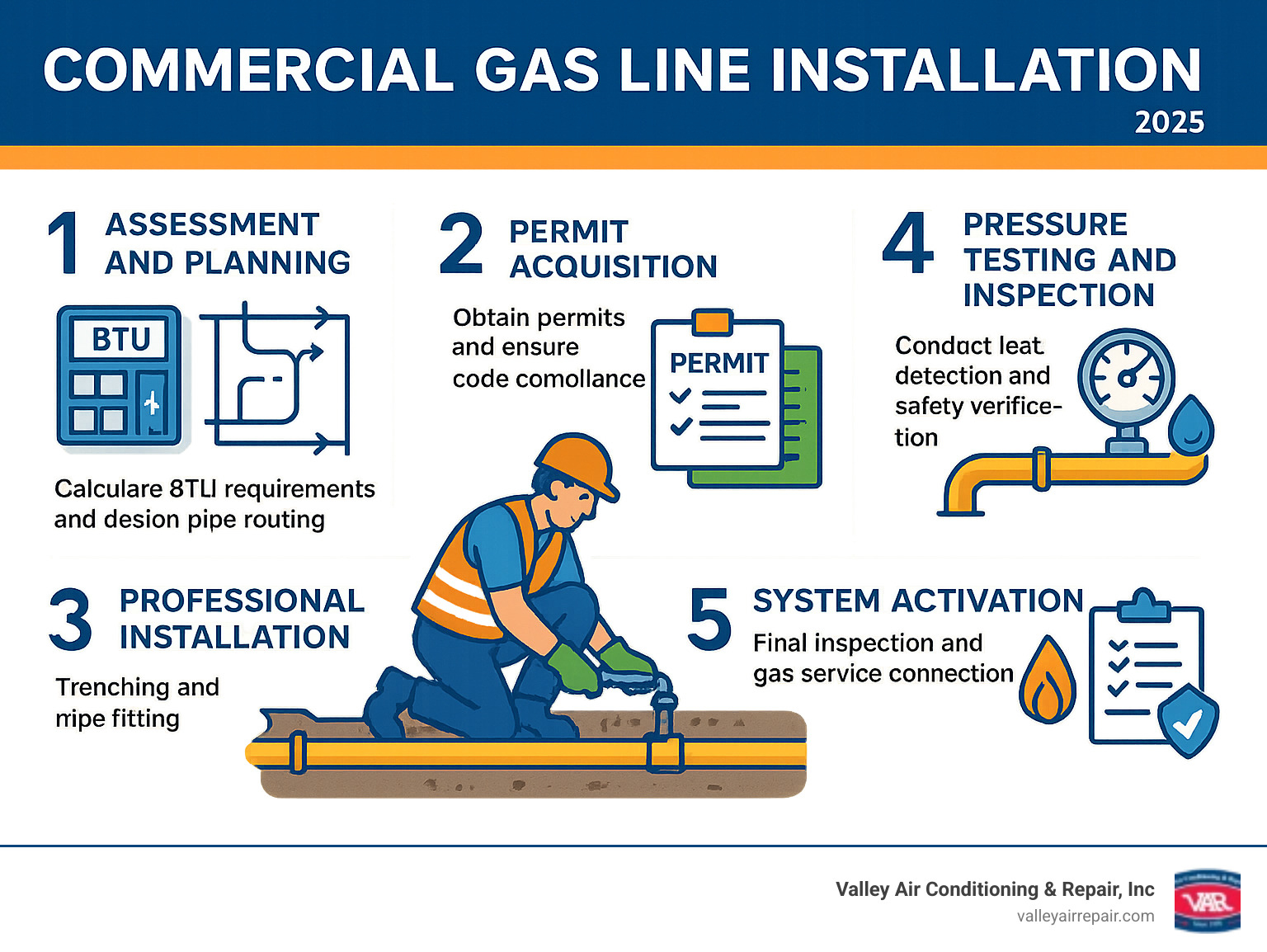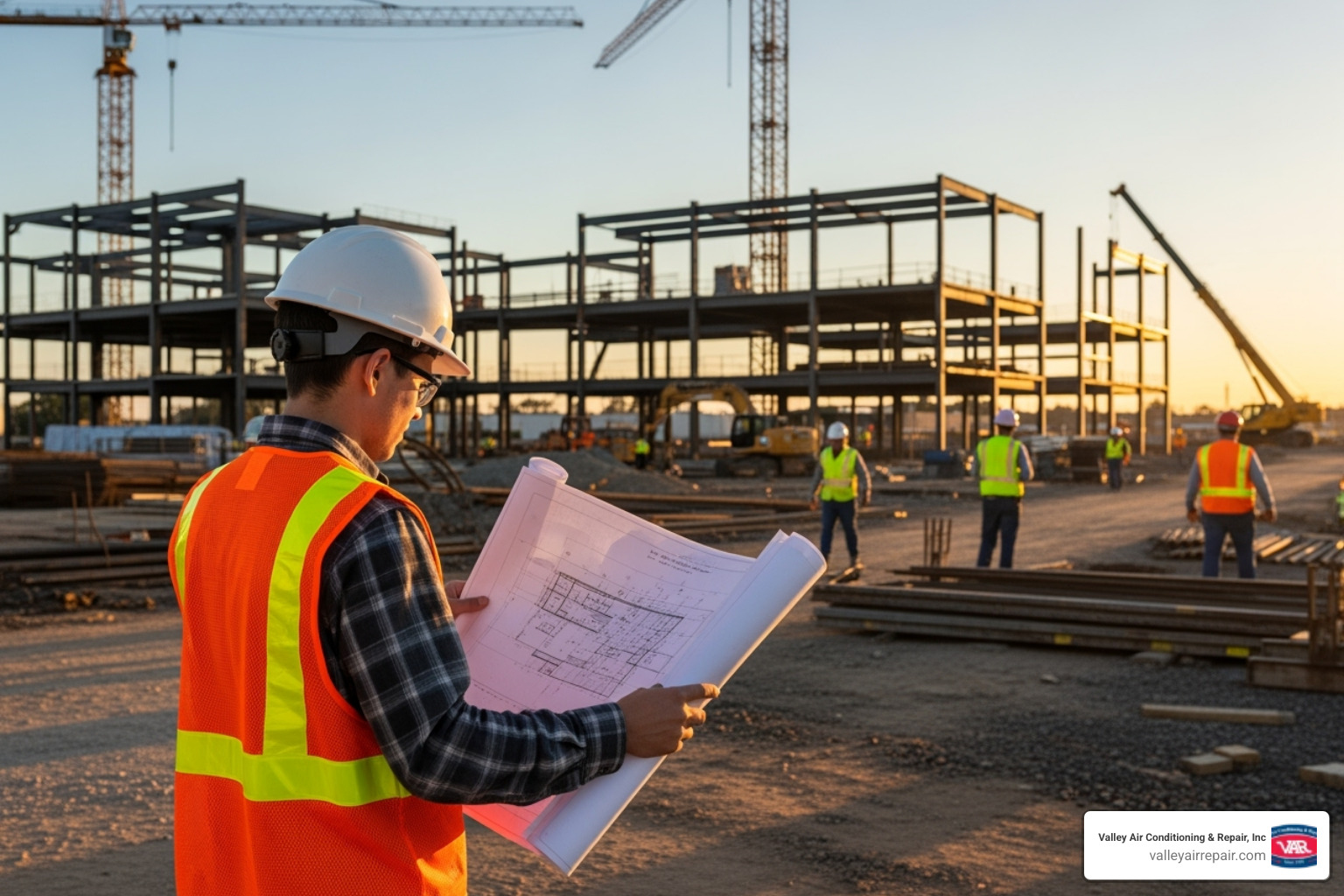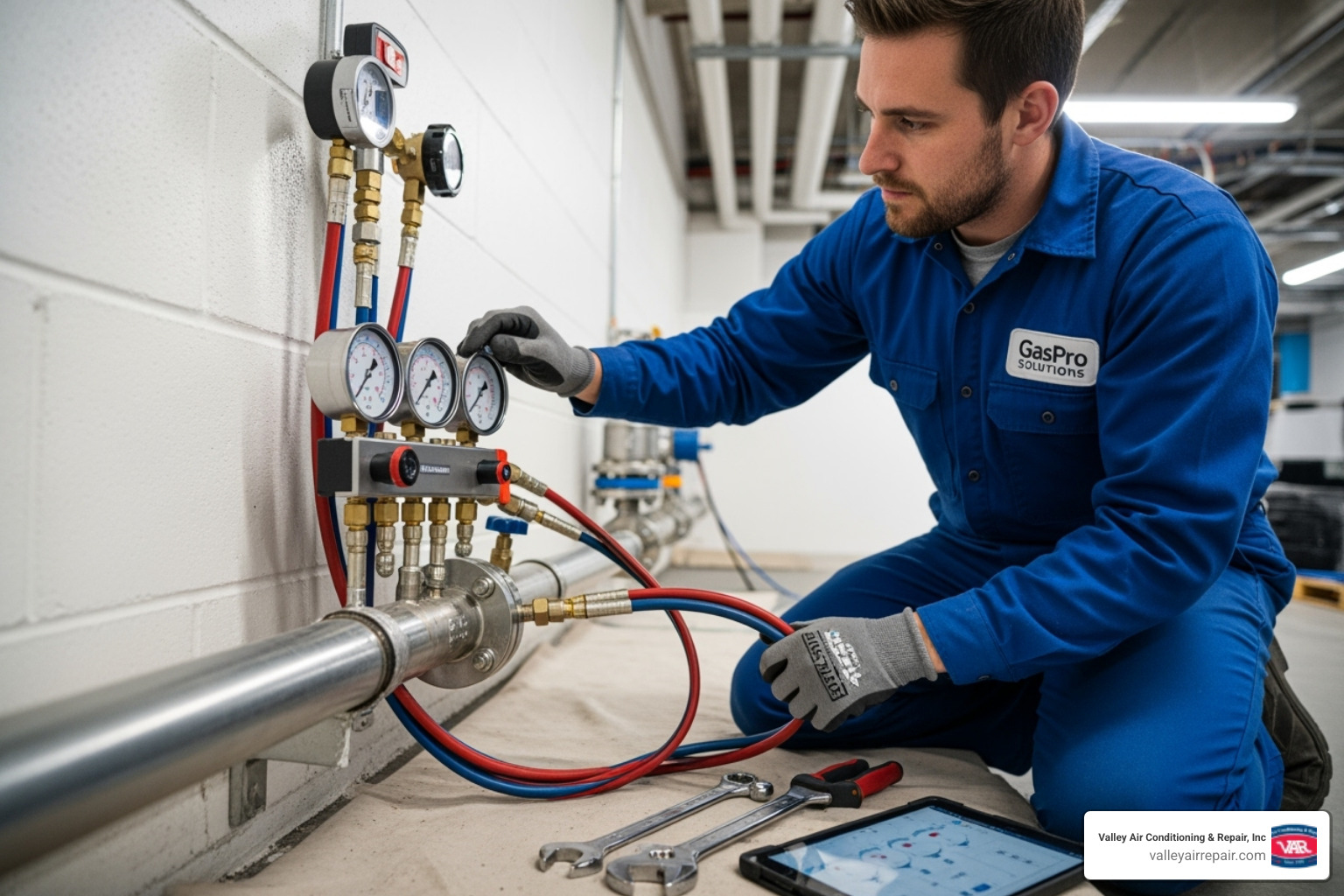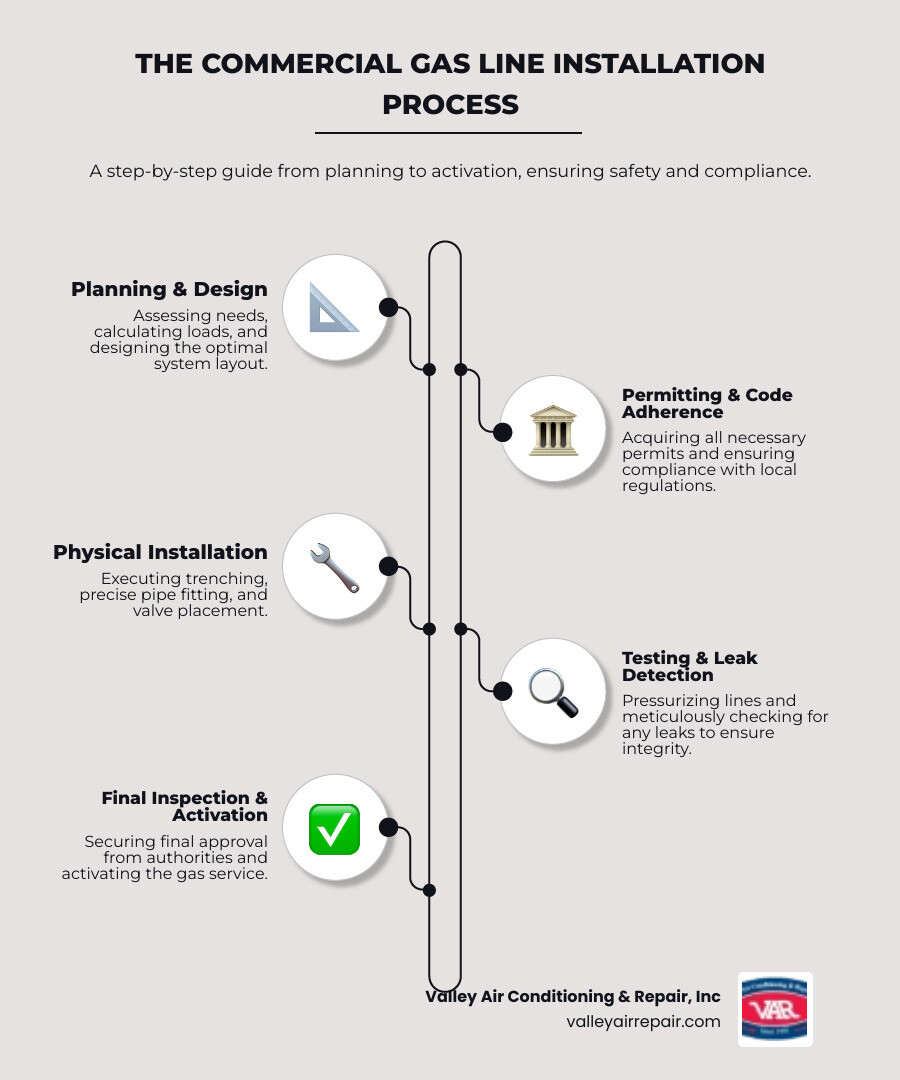Seamless Commercial Gas Line Setup for Your Business

Why Commercial Gas Line Installation Requires Expert Precision
Commercial gas line installation is the process of safely connecting your business to a natural gas supply through professionally designed and installed piping systems. This complex process involves planning, permitting, precise installation, rigorous testing, and final inspection to ensure full code compliance.
Key stages of commercial gas line installation:
- Assessment and Planning - Calculate BTU requirements and design optimal pipe routing.
- Permitting and Code Compliance - Obtain necessary permits and ensure local regulation adherence.
- Professional Installation - Install piping using proper materials and techniques.
- Pressure Testing and Inspection - Conduct leak detection and safety verification.
- System Activation - Final approval and gas service connection.
Whether you're opening a new restaurant, expanding manufacturing operations, or converting equipment to natural gas, proper installation is non-negotiable. The stakes are high, as mistakes can lead to serious consequences like leaks, inefficiency, or dangerous explosions. This is why businesses must rely on licensed professionals who understand local codes, proper sizing calculations, and safety protocols.
Modern commercial gas systems power essential equipment from kitchen appliances to industrial boilers, offering significant advantages over electric alternatives, including lower operating costs and improved energy efficiency. However, these benefits only materialize when the installation is done right the first time.

Why Your Business Needs a Professional Gas Line Installation
Running a business in the Valley comes with unique challenges, and a reliable energy source shouldn't be one of them. Recognizing when your business needs a commercial gas line installation can save you time, money, and future headaches.
- New construction offers a prime opportunity to integrate natural gas from the ground up. Planning for gas lines during the design phase ensures optimal placement and is far more cost-effective than retrofitting later.
- Business expansion, such as adding a second kitchen or more heating equipment, often requires a gas line upgrade to handle the increased load.
- Appliance upgrades from electric to gas can dramatically reduce operating costs, but more powerful equipment often demands larger gas lines.
- Replacing old pipes is a critical safety measure. Aging gas lines can corrode, leak, or fail to meet current safety standards, making proactive replacement a smart investment.
- Code compliance is non-negotiable. As regulations evolve, updating your gas system ensures your business remains compliant, avoiding potential fines or shutdowns.
For comprehensive commercial plumbing services, including gas line installations throughout the Valley, check out our Commercial Plumbing Fresno CA services.
The Benefits of Converting to Natural Gas
Switching to natural gas is a smart business decision that positively impacts your bottom line.
- Cost-Effectiveness: Natural gas typically costs significantly less than electricity for heating and cooking. Some businesses see energy costs drop by up to 40% after converting.
- Energy Efficiency: Gas appliances heat up faster and offer more precise temperature control, reducing energy waste compared to electric alternatives.
- Reliability: Underground gas pipelines are less susceptible to weather-related outages than overhead power lines, ensuring your business stays operational during storms.
- Environmental Benefits: Natural gas burns cleaner than other fossil fuels, producing fewer emissions and helping your business reduce its carbon footprint.
- Increased Property Value: Commercial properties with existing gas service are often more attractive to potential buyers or tenants, signaling a modern, well-equipped facility.
Understanding your energy requirements in British Thermal Units (BTUs) is key to proper system sizing. For more information, visit this resource about More info about BTUs.
Why Professional Commercial Gas Line Installation is Non-Negotiable
Commercial gas line installation is not a DIY project. The risks associated with amateur gas work are too high to trust anyone other than licensed professionals.
- Safety Expertise: Our licensed technicians are trained to handle the inherent dangers of natural gas, following strict protocols to protect your business.
- Code Knowledge: We stay current with all local codes and regulations, which vary by jurisdiction and change over time, ensuring your installation is safe and compliant.
- Proper Tools: We use specialized, professional-grade equipment for pipe threading, pressure testing, and leak detection to ensure precision and safety.
- Insurance and Liability: Our full insurance coverage protects your business from potential liability, a safeguard you don't get with unlicensed installers.
- Long-Term Reliability: Since 1970, we've built our reputation on quality. We install safe, efficient systems designed to serve your business for decades.
For ongoing support, explore our Commercial Maintenance Repair services.
The Commercial Gas Line Installation Process: From Blueprint to Inspection
Understanding the commercial gas line installation process helps ensure your project runs smoothly. While it may seem complex, our experienced team makes it a straightforward journey from start to finish.

Every successful project follows a proven path: project planning, site assessment, permitting, utility coordination, installation, and finally, thorough testing and inspection. This refined process keeps your project on track while ensuring absolute safety.
Step 1: Planning and Design
Great commercial gas line installation begins with meticulous planning. We work to understand your business's specific needs to design a system that performs perfectly for your operations.
First, we calculate load requirements by adding up the BTU ratings of all your gas appliances—from ovens to boilers—to determine the total fuel demand. Incorrect calculations can lead to poor performance or unsafe conditions.
Next, we focus on pipe routing and system design. We map the most efficient and accessible path for your gas lines, considering your building's layout and existing utilities. We also consider your future expansion plans, designing a system with growth in mind to save you from costly overhauls later.
Finally, we handle material selection. We choose the best pipe material—black iron, stainless steel, or polyethylene—based on the application, soil conditions, and local code requirements.
For businesses in areas like Clovis, our local expertise is invaluable. Learn more about our Commercial Plumbing Clovis CA services.
Step 2: Adhering to Local Codes and Regulations
When it comes to gas lines, permits and code compliance are your safety net. We manage all the regulatory details so you can focus on your business.
Permit acquisition is our first step. We secure all necessary permits from local authorities before work begins, preventing fines, delays, or the need to redo work. Local jurisdiction rules can vary significantly between cities like Fresno and Madera, covering everything from pipe materials to safety clearances. For example, regulator vents often require specific distances from ignition sources (typically 3 feet) and air intakes (10 feet).
We handle inspection scheduling to keep your project moving, coordinating with local inspectors for checks at key milestones. All compliance documentation, including test results and approvals, is carefully organized to protect your investment and verify that all work meets the highest safety standards.
To learn more about technical requirements, the Understanding the rules governing gas line installation resource offers comprehensive details.
Step 3: Installation and Testing
This is where careful planning becomes reality as our skilled technicians build your gas system. For underground lines, we begin with trenching, using methods that minimize disruption to your business.
Our technicians then perform precise pipe fitting, cutting, threading, and joining each section to create secure, leak-proof connections. We also complete valve installations at strategic points for safety and maintenance access.
The most critical phase is pressure testing and leak detection. We pressurize the new lines with air and use specialized equipment to check every joint for the slightest pressure drop, ensuring the system is completely sealed. We don't consider the job done until it holds pressure perfectly.
Finally, a final inspection by local authorities provides the official approval. Only after this sign-off is your gas service activated and ready for use.

Critical Factors: Materials, Sizing, and Common Pitfalls
In a commercial gas line installation, the choices made about materials and sizing are foundational to your system's safety, efficiency, and longevity. Compromising on these elements is like building on a weak foundation.
| Pipe Material | Pros | Cons | Applications |
|---|---|---|---|
| Black Iron | Durable and strong, handles high pressures well, widely accepted by codes, cost-effective for large installations | Susceptible to corrosion, heavy and requires specialized installation, needs protective coating for outdoor use | Indoor commercial applications, high-pressure systems, traditional installations |
| Stainless Steel (CSST) | Lightweight and flexible, corrosion resistant, easier installation reduces labor costs, ideal for tight spaces | More expensive upfront, requires proper electrical bonding, needs specialized fittings | Appliance connections, complex routing situations, areas requiring flexibility |
| HDPE | Completely corrosion resistant, flexible for difficult terrain, long lifespan, excellent for underground use | Requires specialized fusion equipment, not suitable for indoor exposed applications, limited to lower pressures | Underground service lines, areas with corrosive soil conditions, long underground runs |

Choosing the Right Materials for Your Gas Lines
Selecting the right material is crucial. Using the wrong pipe for the environment can lead to corrosion and costly repairs.
- Black iron pipe is the traditional workhorse for indoor commercial gas lines. It's highly durable and handles high pressure well, but it requires protective coatings if used outdoors or in humid environments.
- Corrugated stainless steel tubing (CSST) is a flexible, corrosion-resistant option ideal for navigating tight spaces, which can reduce installation time. However, it requires proper electrical bonding to protect against lightning strikes.
- High-density polyethylene (HDPE) is often the best choice for buried gas lines. It's completely immune to corrosion and flexible enough to bend around underground obstacles, reducing the number of joints. It requires specialized fusion welding and is not for indoor use.
- Galvanized steel should be avoided. The zinc coating can flake off and clog gas appliances, and many local codes prohibit its use for natural gas.
We select materials based on soil conditions, pressure requirements, and local codes to ensure a safe, long-lasting system.
The Importance of Correct Pipe Sizing
Correct pipe sizing is critical for a commercial gas line installation to function safely and efficiently. Undersized pipes create pressure drops that starve appliances of fuel, leading to poor performance and potential damage. Conversely, oversized pipes can cause pressure fluctuations and unsafe burner operation.
Proper sizing involves complex calculations based on the total BTU load of all appliances, the length of the pipe runs, and the number of fittings. We take precise measurements to ensure your system delivers consistent, reliable performance, avoiding the frustration and expense of an improperly sized system.
For technical guidance on pipe sizing, professionals often reference resources like Proper sizing for the gas piping. We apply these rigorous standards to every installation in Madera and beyond. Learn more at Commercial Plumbing Madera.
Common Mistakes to Avoid During a Commercial Gas Line Installation
After decades in the business, we've seen nearly every mistake possible. Most of these costly errors are preventable with professional oversight.
- Inadequate Planning: Starting work without calculating load requirements or considering future expansion leads to poor performance and expensive retrofits.
- Ignoring Local Codes: Each jurisdiction has specific rules. Assuming one city's code applies elsewhere can result in fines and reinstallation orders.
- Material Mismatches: Using indoor-rated pipe outdoors or materials incompatible with the gas type creates safety hazards and premature system failure.
- Sloppy Installation: Loose connections, improper threading, or skipping pressure tests can lead to leaks and dangerous conditions. There are no shortcuts to safety.
- Skipping Maintenance: A gas system is not "install and forget." Regular inspections are necessary to catch small issues before they become major emergencies.
Budgeting, Maintenance, and Emergency Safety
Understanding the costs, ongoing maintenance, and emergency procedures are all part of responsible ownership of a commercial gas line installation. We ensure our clients are fully informed on all aspects.

Factors Influencing Installation Costs
While every project is unique, several key factors determine the cost of a commercial gas line installation.
- Project Complexity: A simple installation with clear access costs less than a complex one requiring work in tight spaces or around existing equipment.
- Pipe Length: Longer runs require more materials and labor, directly impacting the overall cost.
- Materials Used: Material costs vary, with black iron being budget-friendly and options like CSST or HDPE having different price points and labor implications.
- Labor Rates: Licensed professionals typically charge between $50-$150 per hour, reflecting the specialized training and responsibility involved in gas work.
- Permit Fees: Depending on your location and project scope, permit fees generally range from $50-$300.
- Accessibility: Difficult-to-reach installation sites may require more time or special equipment, affecting the cost.
We provide transparent estimates so you know exactly what to expect.
Ongoing Inspection and Maintenance
Your commercial gas line installation requires regular attention to remain safe and efficient. We recommend annual inspections as the gold standard for commercial systems.
During an inspection, our technicians perform leak surveys using electronic equipment to detect even minor leaks. We conduct valve checks to ensure shut-off valves operate correctly, and we inspect appliance connection integrity, as these flexible connectors can wear out in busy commercial environments.
Regular maintenance is not just about safety; it's about protecting your investment. A small issue caught early can prevent a costly emergency repair and business shutdown later.
Learn how preventive care can save your business from expensive emergencies in our guide on how to Prevent Emergency Commercial Plumbing Situations.
Recognizing and Responding to a Gas Leak
Every business owner and employee should know the signs of a gas leak and how to respond. The most obvious sign is the rotten egg smell that utility companies add to natural gas. Other signs include hissing sounds near gas lines, dead vegetation near outdoor lines, or bubbling ground after rain.
If you suspect a gas leak, follow these steps immediately:
- Evacuate Everyone: Get everyone out of the building immediately. Do not stop to collect personal items.
- Avoid Ignition Sources: Do not flip light switches, use any phones (including cell phones), start vehicles, or operate any electrical device. A tiny spark can ignite the gas.
- Leave It Alone: Do not attempt to find the leak or shut off any gas valves yourself. Leave this to the professionals.
- Call for Help: From a safe distance away from the building, call 911 and your gas utility company's emergency line.
After the utility company has declared the area safe, contact us for a thorough inspection and any necessary repairs before resuming operations.
For more details on gas leak safety, you can reference What to do if you notice a sign of a gas leak.
Conclusion
A professionally installed and maintained commercial gas line installation is the backbone of your business, powering everything from kitchen appliances to industrial heating systems. It's a critical investment in your operational efficiency, safety, and success.
We've covered the key reasons for a new gas line, from new construction to appliance upgrades, and highlighted the benefits of natural gas, including significant cost savings and reliability. The installation process—from planning and permitting to testing and inspection—is a detailed procedure where every step matters. Choosing the right materials and ensuring correct pipe sizing are crucial for long-term performance.
However, the most important takeaway is that gas line work is inherently dangerous and not a DIY project. It requires licensed professionals with the expertise to steer complex codes, perform precise calculations, and ensure a leak-free system. Mishandling this fuel can have catastrophic consequences.
At Valley Air Conditioning & Repair, Inc., we've been building trust with a customer-first philosophy since 1970. We don't just install gas lines; we build long-term partnerships, providing ongoing maintenance and the peace of mind that comes from working with seasoned experts.
Your business deserves a gas system that is safe, reliable, and built to last. When you're ready to power your future, we're here to guide you every step of the way.
Ready to get started? Contact us for expert commercial plumbing in Fresno, CA and let's discuss your project.




.webp)









